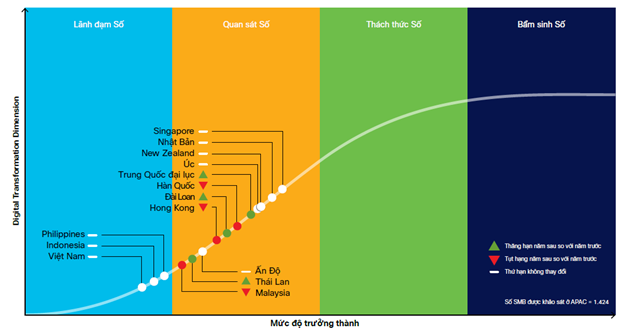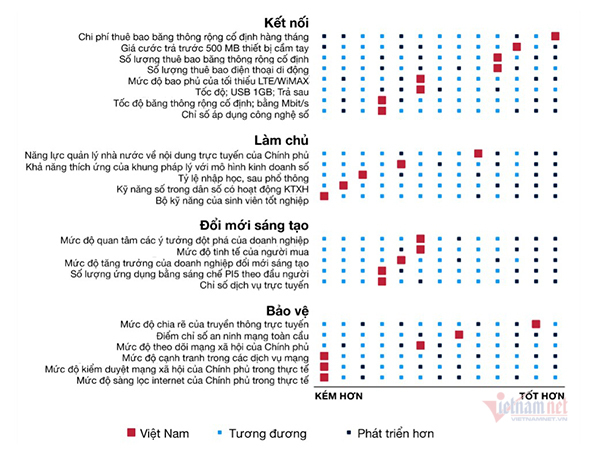The readiness of Vietnamese enterprises for digital transformation remains low
Each report will look at "Vietnam's digital transformation path" from a different perspective. But the roads will eventually lead to a common point, which is a prosperous and happy Vietnam.
According to the study on digitalize maturity of Small and Medium Enterprises - Asia-Pacific SMBs (APAC) by IDC - Cisco in 2020, the majority of Vietnamese enterprises have a level of readiness of transform conversion rate at the lowest in the surveyed countries.
The overall assessment of IDC - Cisco shows that Vietnamese businesses are at the Digital Indifferent level (companies focusing on cost-effectiveness, have not yet invested in digital transformation, most processes are performed by humans, lack of digital skills).
This study suggests that, due to the influence of Covid-19, Vietnamese enterprises are now more or less aware of the role of digital technology applied in their production and business activities. However, the level of awareness and application is still very different between businesses, between industries and even regions.
The World Bank has also recently published a report on Vietnam's digital transformation. To assess the current state of Vietnam's digital transformation, the World Bank has used four pillars: connection, ownership, innovation, and protection.
The World Bank compared Vietnam with 12 countries and selected 2 groups of countries. In particular, group 1 (equivalent countries), includes middle-income economies and has a similar digital transformation status with Vietnam, such as South Africa, Côte d’Ivoire, Thailand or the Philippines. The second group is more developed countries like Singapore or South Korea.
According to Mr. Jacques Morisset is the World Bank Lead Economist and Program Leader for Vietnam, in terms of connectivity, Vietnam has a relatively good ranking because most people have access to digital tools and the Internet.
With the pillar of ownership, which is what can be done with digital tools, Vietnam does not have a very good ranking and needs more digital skills and a regulatory framework to operate in the digital economy.
In terms of innovation or adaptability to digital technologies, Vietnam has made some progress and is in the middle among the countries compared.
In the last pillar of protection, Vietnam's results are not unequal. Vietnam ranks relatively well in terms of cybersecurity, but in terms of data accessabilities and interoperability of operators, Vietnam ranks relatively low compared to other countries.
Adding a perspective on this issue, Mr. Tran Huu Quyen – Chairman of VNPT Technology (a member of VNPT Group), an expert in digital transformation of SMEs, said that digital transformation has become a trend that has been strongly interested and promoted by the whole society in recent years.
This makes it easy for organizations and businesses to access reference about digital transformation, as well as lessons learned about domestic and international digital transformation, on that basis, to build a roadmap and implement appropriate digital transformation.
Vietnam has a good telecommunications and IT infrastructure. Not only that, recently a number of domestic technology corporations and digital enterprises such as VNPT, FPT, Base.vn, etc. have been building, developing and perfecting digital transformation platforms, facilitating and helping organizations and enterprises deploy digital transformation easily and quickly.
However, according to Mr. Quyen, organizations and businesses are also facing many difficulties such as digital technology capacity, governance capacity, financial capacity, ... and it is impossible not to mention corporate culture, in which it is necessary to emphasize the shared culture and transparent working environment.
One of the decisive factors to the success of digital transformation in organizations and businesses is the will of leaders. Therefore, among the difficulties when implementing digital transformation in Vietnam, the human barrier is still the biggest barrier.
 Vietnamese
Vietnamese 



